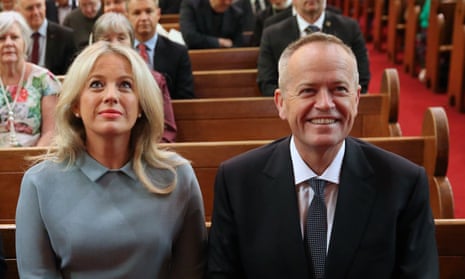The banking royal commission findings appear to have delivered a political fillip to Labor, with the opposition extending its lead over the Coalition 55% to 45% on the two-party-preferred measure.
The new Guardian Essential poll, taken before Monday’s major party brinkmanship on asylum seekers in the lead-up to the resumption of parliament, puts the government’s primary vote on 34% and Labor’s on 38%, and the independents’ share of the vote has risen to 11%, up from 9%.
The positive movement in Labor’s direction follows a shift in favour of the Coalition in last week’s survey. Last week Labor was ahead of the Morrison government on the two-party-preferred measure 52% to 48% – a shift within the margin of error from the last voter survey of last year, and one in mid-January that had Labor ahead 53% to 47%.
The fallout from the banking royal commission, controversy over the Liberal Tim Wilson’s use of a taxpayer-funded inquiry into Labor’s policy on franking credits to leverage a partisan campaign, and an escalating political brawl about border protection dominated the news last week.
Voters in the survey were asked a series of questions about the final recommendations of the banking royal commission delivered by Kenneth Hayne. The responses suggest people are impatient to see parliament move on the changes proposed by the royal commissioner, but are cynical about whether the process will deliver lasting improvements.
Both Labor voters (63%) and Coalition voters (62%) say the current session of parliament should not conclude until the banking royal commission overhaul is dealt with.
Labor and the crossbench have already signalled an attempt to extend the sitting calendar to ensure more time is given to banking reform. The government disagrees on the rationale that the Hayne response not be rushed, and it has sought to curtail the sitting program before the May election given that its minority status makes the chambers more difficult to manage.
Parliament is only scheduled to sit for three weeks before Australians go to the polls after the budget.
Australian voters are sceptical about whether the overhaul presaged by Hayne will transform culture in the financial services sector.
A quarter of people surveyed doubt the process will make a real difference to the way banks will operate (25%) and just under half (47%), think it will only lead to minor changes. People aged between 35 and 54 were most likely to believe the status quo will prevail.
People intending to vote for micro-parties or independents in the coming election are the most likely cohort to think there will be no change as a result of the Hayne report (37%).
Major-party voters are more likely to trust their own side to deliver the Hayne findings faithfully, with 60% of Labor voters, and 56% of Coalition voters trusting their party to deliver.
But more than a third of respondents (35%) say the colour of the incumbent government will make no difference to the outcome. Greens voters (45%) and minor-party/independent voters (58%) are most likely to think it will no make a difference if a Liberal or Labor government implements the changes.
While Australians overwhelmingly want a more ethical banking sector, and believe that would be good for the economy (72%), they aren’t holding their breath.
An emphatic majority, 71%, think banks will always find a way to exploit their customers and more than half (54%) agree that the banks will find a way to block politicians from implementing any meaningful reform in the sector.
Just under a third of Australians (31%) report they have considered moving their money away from bigger banks as a result of the revelations of the royal commission.
There is some concern that restrictions on lending could hurt the economy. While 37% of Australians agree the economy would suffer owing to too-restrictive regulations, 28% disagree with this statement. Coalition voters were the cohort most likely to agree that restrictions on banks could damage the economy (46%).
The Coalition resisted calling the royal commission for more than a year, and 39% of the survey believe the government never supported the inquiry and will do all it can to water down the recommendations. Men are more likely than women to hold that view (44% v 35%).
People aged 55 and older were most likely to agree that banks would always find ways to exploit customers (78%) and the banks would find a way to block meaningful reform (63%).
